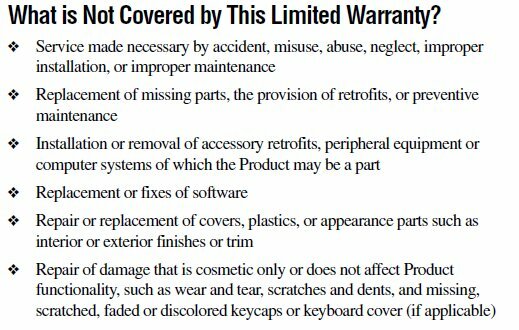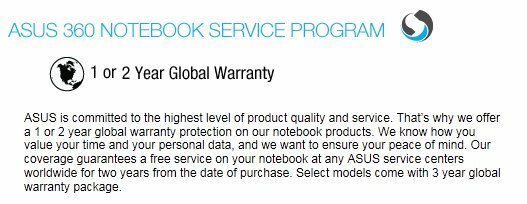Laptops are a big investment and, as I’ve discussed before in my laptop reliability article, they’re also prone to failure. Although about 70% of laptops will survive past their third year, a 30% three-year failure rate is still quite high on a product that often costs over $500, particularly when you consider the fact that repairs are often prohibitively expensive.
Many users therefor turn towards their laptop’s warranty for assurance. But is there any real difference between the warranties offered by different manufacturers? Let’s have a look.
The Standard One-Year Laptop Warranty
Almost every laptop sold in North America is covered by a similar one-year limited warranty. Of course, you’re probably wondering what the term “limited” refers to. Don’t worry (much) – the term isn’t trying to scam you, but there are some things that warranties generally don’t cover. Although you’ll need to refer to each manufacturer’s website for the specifics, here are he most common exclusions.
- Accidental damage / “acts of God” (If you drop your laptop, you’re out of luck).
- End-user modification (If you try to replace the hard drive and screw up, you’re out of luck).
- Software malfunction (If you’re having problems with software running on your laptop, call the developer).
- Appearance parts (You can’t have the laptop’s lid replaced because of a scratch).
- Service outside of the intended market (If you import a North American market laptop to Europe, you warranty is likely void).
- Defacement (The strangest term in some warranties – if you remove the brand label from a laptop the warranty might be void).
So what is covered? Generally, coverage is limited to design or manufacturing defects. The standard one-year laptop warranty covers both parts and labor during the warranty period. One area that does seem to vary, however – and you may want to check before buying – is the coverage applied to repairs done. Toshiba’s standard one-year warranty covers “warranty materials and workmanship” for a paltry 30 days or until the end of the warranty period, whichever is longer. Sony, on the other hand, covers its repairs for up to 90 days or the end of the warranty period.
Standard 2-year and 3-year Warranties
While most laptops have a one-year warranty, those aren’t the best laptop warranties you can find. There are a handful of laptops that come with longer standard warranties. ASUS, for example, is now shipping a variety of laptops with a two-year warranty. That’s a smart move for ASUS – the company is known to have some of the most reliable laptops in the busines, and ASUS’s longer warranty gives the company a way to use that edge against competitors.
They’re not the only one to make an exception, however. Dell attaches three-year warranties to some of its Latitude and Precision business laptops, and it’s not uncommon for companies to throw in a three-year warranty on laptops that cost over $1000. The , for example, comes with a standard 3-year warranty while the less expensive only receives one year of coverage.
If you’re looking for the best laptop warranty, look for a laptop with a standard two or three-year warranty.
Third-Party Warranties
If you buy a laptop at a brick-and-mortar store you’re undoubtedly going to be hit up for a “product replacement plan.” These third-party extended warranties are often traps, however, for a number of reasons. If you’d like a great example, check out the Best Buy forums. In a thread there, a person with the Best Buy product replacement plan posts that they dropped their laptop in a pool. Obviously, it won’t power on any longer. Woops! But they’re covered, right – after all, their plan provides protection against accidents that the manufacturer warranty doesn’t. That’s why they bought the plan.
Not so fast. According to a Best Buy representative, “Your Performance Service Plan (PSP) with Accidental Damage from Handling (ADH) is intended to cover damage from normal wear and tear, drops and spills. Unfortunately, full immersion of the computer in water is not covered by the PSP, even with ADH.” Of course, the poster isn’t happy – when they got the plan, the sales rep told them that the warranty would provide full protection against accidents. Apparently, it only provides full protection against normal accidents, whatever the hell those are. Despite being called out on a public forum, Best Buy did not relent.
I think you can see the problem here. Even if you buy at third party warranty, there’s no guarantee they’ll actually pay up. If you do want to buy a warranty for some extra peace-of-mind your best bet is probably SquareTrade. Unlike stores, which sell warranties as a means of increasing their margins and are therefor reluctant to actually pay when required, SquareTrade is essentially a insurance company.
My advice, though, is to simply stay away from third-party warranties altogether.




You must log in to post a comment.